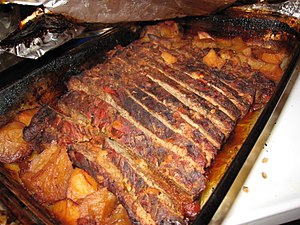
Let all who are hungry come and eat.
In a few days, we will read those words from the Haggadah.
Very soon, Jews all around the world will sit down to a seder meal, to listen to the story, to ask questions, to laugh, to share one another’s company, and to eat. Every family has its own favorite recipes: for my family, it is the brisket I slow-cook every year, 8 hours at least in a low, low oven, simmering with tomatoes and root vegetables until we all go crazy smelling it.
But there are other families, Jewish and not, where there will be no feast that first night of Passover, where the phrase “bread of poverty” is not simply a ritual observance. In 2011, over 50 million Americans lived in “food insecure households.” Stop and ponder: Fifty million Americans were unsure of their next meal last year.
That means that if you live in the United States, somewhere within easy driving distance of your home, someone is going hungry.
I have learned, as a rabbi, as a person to whom people tell their secrets, that many of the hungry are not the stereotype in your mind. Some of them are your neighbors. Some of them do everything they can to keep their dignity, to not let on. But they line up for some free vegetables behind a church where they think no one will recognize them. They don’t tell their kids where the food came from.
Let all who are hungry come and eat.
How can we keep our words at the seder from being a cruel farce? In the long run, it will require political action, and we are yet to come to agreement about how to proceed about that as a nation. In the short run, there is much we can do, and it is easy to do. Find your local food bank (the link will lead you to an online tool). Send what you can afford. Food banks are organizations that do the buying and gathering of food for many local agencies, to make every dollar go the farthest. If you want your tzedakah dollar to go far, to be a “good investment,” give to your local food bank. It’s very easy to give: most food banks offer an online donation link.
It is a Jewish tradition to give tzedakah, to give charity funds for the relief of suffering, before every holiday feast. The Torah tells us in no uncertain terms, Lo ta’amod al dam rei-acha — don’t stand idly by while your neighbor bleeds (Leviticus 19:16). People in our neighborhoods suffer from food insecurity – they are not sure of their next meal. It is up to us to act. It is up to us to make sure that the words we read aloud from the Haggadah are true:
Let all who are hungry come and eat.
Related articles
- The children going hungry in America (bbc.co.uk)
- Senior Hunger – What to do if you are Food Insecure (assistedlivingtoday.com)
- Food banks can only plug the holes in social safety nets | Olivier De Schutter (guardian.co.uk)

